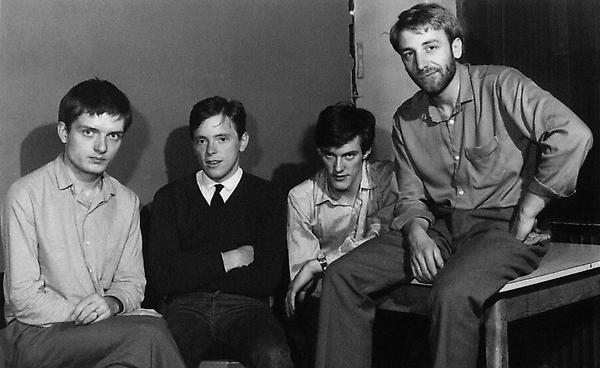Book Review: Guilty Pleasures? — Rocker Peter Hook Takes Us Inside Joy Division
Peter Hook’s memoir contains no earthshattering revelations, but it does offer a new way (or at least another way) of thinking about the four young men who made up Joy Division.
Unknown Pleasures: Inside Joy Division by Peter Hook. It Books, 416 pages, $27.99.
By Adam Ellsworth
Rock and roll memoirs are a dime a dozen these days. In fact, if you were in a band and you haven’t written about your experiences yet, there might just be something wrong with you. When it comes to this emerging genre, former Joy Division and New Order bassist Peter Hook is no Johnny Come Lately. His first book, The Hacienda: How Not to Run a Club, was published in 2009, the year before Keith Richards’s epic memoir Life burst open the floodgates and every rocker under the sun was suddenly a writer.
The Hacienda wasn’t really a book about being a musician, though. It was a book about how a musician and his band mates sunk all their earnings into a dance club and what an absolutely terrible (but entertaining) idea that is. Now, with the release of his new book, Unknown Pleasures: Inside Joy Division, Hook has given us a more traditional rock memoir, filled with rehearsals, recording sessions, band high jinx, live performances, and lots of time spent driving around in a van.
Unknown Pleasures is hardly the first work on the subject of Joy Division. The story of the post-punk icons from Manchester, England has been well covered over the years in books (Touching from a Distance by Deborah Curtis, widow of the band’s lead singer Ian Curtis; Torn Apart: The Life of Ian Curtis by Mick Middles and Lindsay Reade), documentaries (Grant Gee’s Joy Division, which is available for free viewing through imdb.com), and even biopics (Anton Corbijn’s Control; Michael Winterbottom’s 24 Hour Party People). People familiar with the “facts” of the band’s history will find little in Unknown Pleasures that they didn’t already know. But while the book offers no earthshattering revelations, it does offer a new way (or at least another way) of thinking about the four young men who made up Joy Division. Hook was one of those young men after all, which is more than any other chronicler of the band’s history can say.
First and foremost, it turns out that the members of Joy Division had a lot of fun together! “Fun” is not normally included in the telling of the Joy Division saga. When a band is known for making brooding music and having a lead singer who hanged himself at 23, it’s easy to see how all the laughter and goofing around that they shared can get lost in the shuffle. But fun is at the center of Unknown Pleasures. Hook is a natural and wildly entertaining storyteller, and even when he writes about well-known parts of the band’s history, he gives these old tales new life. A perfect example of this is Hook’s account of a prank he and his band mates pulled on Buzzcocks while the two bands were on tour together. The epic jape (which involved maggots, mice, shaving cream, and eggs) receives at most a few paragraphs in other accounts of the Joy Division story; Hook devotes five pages to the prank’s planning and execution. To Hook, being in a band means having a good time, and being in Joy Division was no exception.
Still, the book is not all fun and laughter. That unfortunately isn’t possible when talking about Ian Curtis. While the book is filled with recollections of when Curtis was at the center of band’s fun and acting like one of the lads, Hook writes with painful honesty about how he and his band mates (Bernard Sumner and Stephen Morris) didn’t know how to deal with the physical and psychological troubles that plagued their lead singer. Curtis was diagnosed with epilepsy in January 1979, just months before the release of the band’s debut album—the band simply carried on as if nothing had happened. They were of course frightened when Curtis started suffering epileptic fits while onstage, but eventually even these fits became routine. After such an event, Curtis would always recover, say he was fine, and the band would plow ahead. “I should call the book that, shouldn’t I?” Hook asks at one point: “He Said He Was All Right So We Carried On.”
Although Hook, Sumner, and Morris were at least aware of Curtis’s struggles with epilepsy, Hook admits that they paid no attention to Curtis’s struggles with depression and the confusion and guilt Curtis felt over being married to one woman while he was in love with another. In many cases, Curtis was writing lyrics that plainly spelled out what he was going through, but it was only after his suicide in May 1980 that Hook and the rest of Joy Division realized just how literal Curtis was being (sample lyric, from the 1980 song “Isolation”: “Mother I’ve tried, please forgive me/I’m doing the best that I can/I’m ashamed of the things I’ve been put through/I’m ashamed of the person I am”).
“Me, I feel guilty,” Hook confesses near the end of Unknown Pleasures. “Guilty that I never went to see him when he was lying in state. Guilty that I never said good-bye. Guilty that, like everybody else, I went along with Ian when he said he was all right; that I was so wrapped up in my own bit of me, of the band, that I never took the time to listen to his lyrics or him and think, He really needs help.”

Peter Hook — his account of a prank he and his band mates pulled on Buzzcocks while the two bands were on tour together involved maggots, mice, shaving cream, and eggs.
In passages like this, Hook makes no excuses and seeks no sympathy. Still, it’s hard to read Unknown Pleasures and not come away from it concluding that all the members of Joy Division were just kids. All of them, even Curtis, were too young to know how to deal with things like epilepsy and marital problems and depression. They just wanted to have fun and act like rock stars, which, in more cases than a lot of people realize, is exactly what they did. All of them. Even Curtis.
After the death of Curtis, Hook, Sumner, and Morris (along with Morris’s girlfriend and future wife, Gillian Gilbert) formed the band New Order and went on to the kind of success that Joy Division could only dream of. New Order still tours, but Hook hasn’t played with the band since 2007, and to say the split has been “acrimonious” would be the understatement of the century. Hook has said that he’s planning to write a third book, this one about his time in New Order. “Fun” will probably not be the word that comes to mind when describing the tone of that volume.


